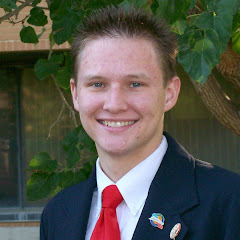Published Originally in the Utah Statesman on Jan. 28, 2008; Online at Utah Statesman.
By JP Parrish
Staff Writer
Preston Parker, adjunct professor in the journalism department, was diagnosed with cancer ten months after getting married. CAMERON PETERSON photo
With nine degrees and a tenth on the way, Preston Parker said he is a strong advocate in lifelong learning and not necessarily in formal education.
"Thirteen years of schooling with only three summers off," Parker said. “I didn’t plan it that way. After each degree there was a new opportunity.”
Parker, who is currently working on his doctorate’s at USU, is an adjunct professor in the journalism department. And his college education began while still in high school, he said. Considering himself an introvert up until his senior year, Parker said he realized he had undiscovered potentials as he was appointed to a student body officer position at Clearfield High. In that position, he said he worked with public relations and realized he had a passion for it. Parker said he was accepted to Utah State University with a year and a half of college completed. He received the Presidential scholarship, covering four years of tuition and fees. Although Parker said he began in engineering, he ended up switching majors several times before he received his first bachelor of arts in business management and another bachelor of arts in liberal arts and science. He also received minors in Spanish, physics, and mathematics.
A week after he graduated, he became engaged to his wife. He had aspirations for film school and applied only to be rejected on the basis of being overqualified; knowing more than the school could teach him. So for another year, Parker said he continued education and earned a master of science in instructional technology.
After only 10 months of marriage, he was diagnosed with an aggressive form of cancer. The cancer was said to double every two weeks leaving him only six months to live. While overcoming this obstacle, Parker said he had his first child, received his first master’s degree, and applied to a doctorate program at Indiana University. He eventually overcame the cancer and started classes five weeks late due to the chemo-therapy.
Parker said the colleagues he met in college and grad schools are colleagues for life and the ones to turn to for help.
“If you’re just holding out in the library all the time to get good grades, you’re missing out on meeting people,” Parker said.
Parker said although the school system is working as well as it can, it eventually needs to transition to an information age education system.
Doing away with grades by age and letting students progress level by level based on ability and mastery of the skill taught is something Parker said would be valuable to a school system. Basically, a student with no age limits can build a portfolio, he said.
“You can go to college when you’re 11,” he said.
Right now the system caters to the bottom 20 percent, he said and change is needed. Parker said formal education is needed, an education that requires tuition of some kind. Parker said tuition is what pays for the experts. Formal education is important, he said, because it gives access to experts, a diploma, and it gives networking.
Lee Cannon, sophomore in public relations said Parker is a valuable professor because he considers the students his peers.
“Preston really has a goal to give students a comfortable atmosphere to learn in and ... he is here to learn with us,” Cannon said.
Besides being in the school scene, Parker said he enjoys being involved in entrepreneurship. His family has a small business in produce right now, Parker Farms Produce. Preston is part owner in the business and oversees the Cache County branch. He said they supply fresh produce to many local restaurants including Hamilton’s, Ruby Tuesdays,Café Sabor and Old Grist Mill to name a few. The company also attends farmers markets in many places from Salt Lake to Cache County.
“I do it for my kids and it gets me active and out of an office all day,” Parker said. “The next generation (of family) will need summer jobs.”
While growing up in Clinton, Utah, Parker said his father was a fourth generation farmer. Since Parker’s youth, his father worked in dairy farming, he said. Parker has one brother and three sisters, all of whom are involved in Parker Farms Produce.
For now, Parker Farms Produce is transitioning from cattle to produce, Parker said. Right now the company is only using five acres in produce of 130 the family owns so there is room, he said, for company growth.
While at Indiana University, Parker said he worked in the instructional systems technology program working to earn a doctorate. He also earned a master’s of arts in mass communications, a multimedia production management minor and education specialist degree in instructional systems technology program. After earning both of these at Indiana University, Parker transferred his work back to Utah State to work with a specific professor at Logan campus in the instructional technology program.
But at the end of the day, after all his degrees, Parker said what really matters is teaching his students.
“It’s a real honor to have students in the classroom that come wanting to learn,” Parker said.
